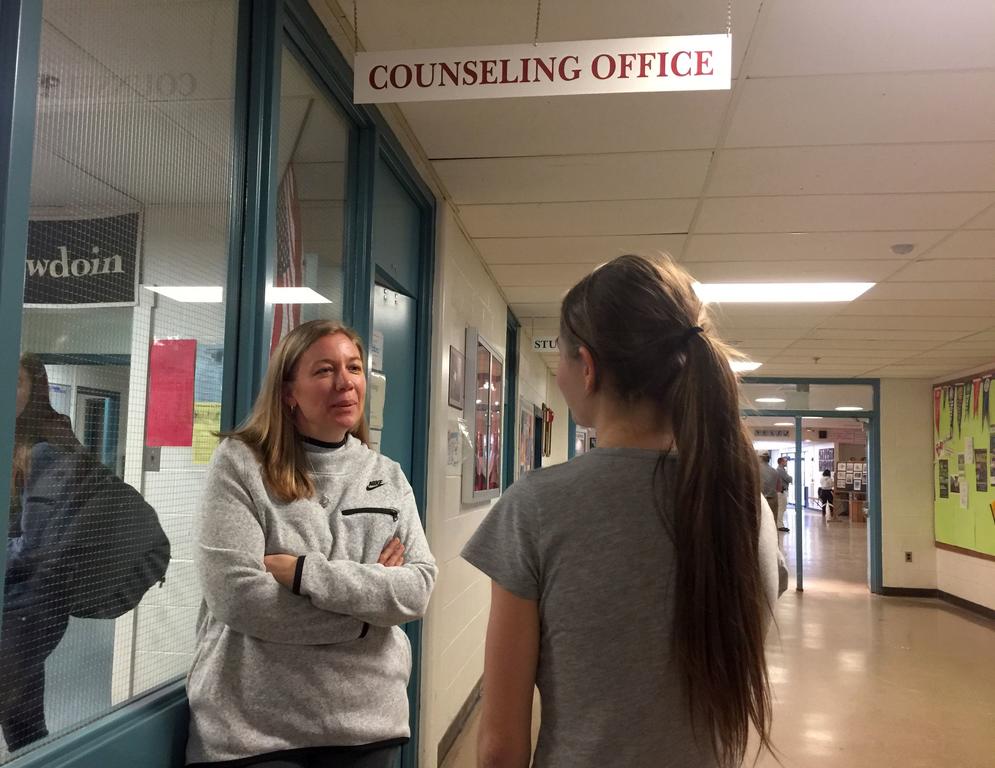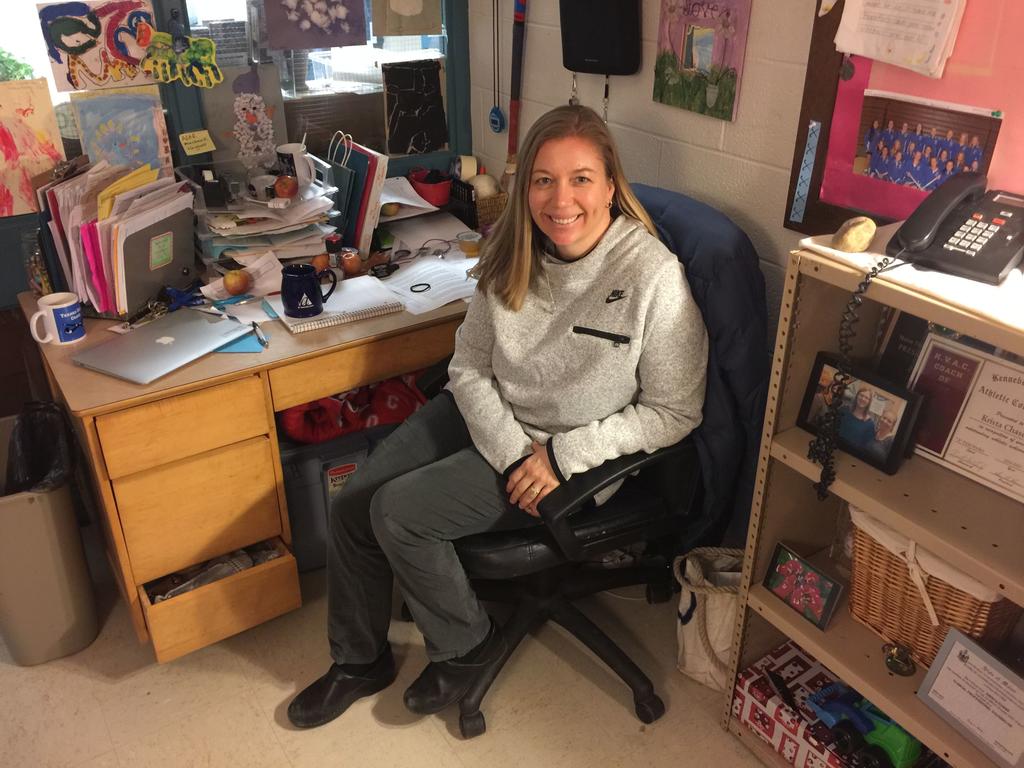Second of three stories.
Krista Chase’s counseling office at Mt. Ararat High School is cozy and warmly lit, with student memorabilia covering the walls and a comfortable seat for teenagers to unload what’s on their minds.
Chase, also the Topsham school’s field hockey coach, has spent 20 years as a high school counselor, including 13 at Cony in Augusta, and five at Mt. Ararat. She graduated from Cony in 1992, seven years before the Columbine High School shooting shocked the country.
The latest similar tragedy – the Feb. 14 school shooting in Parkland, Florida, that took the lives of 17 students and staff – was followed by school threats and a bomb scare Feb. 15-16 at Mt. Ararat High School and the nearby Woodside Elementary School. Police on March 5 arrested a Bowdoinham man in connection with a threat of physical violence at Mt. Ararat.
Back in Chase’s high school years, 1988-1992, “we had bomb threats; maybe there was a little anxiety around them, but it felt more like a drill,” she said in a March 12 interview in her office alongside school Principal Donna Brunette.
As the anxiety level has increased, so has the response of the school. What were called “guidance counselors” are now “school counselors.”
“It’s become a much more counseling profession,” Chase said, noting that 20 years ago, a student tended to approach a guidance counselor for a college recommendation, and “it was much more of an emphasis on the academic (realm), or college, or career focus.”
Since then, the role has “changed dramatically,” she said. “There is so much more need for the personal-social piece.”
A school counselor is trained to focus on three areas: academic counseling, personal and social counseling, and post-secondary and career planning.
“But the need for the personal-social has far surpassed anything that we do,” Chase said. “In addition to that is crisis response. And that has really become almost a fourth tier of our work.”
About half her time is spent with students in situations they need to talk through. Ten years ago that might have absorbed just a quarter of Chase’s day, she said. Greater time was available back then to do more proactive work, such as partnering with health teachers on suicide prevention.
Brunette said that change “speaks to the addressing of personalized learning issues, that I think has begun to consume more than half of the time of counselors. And the opportunity to get out and speak with kids in general, and do proactive types of sessions, and get to know large bodies of students well, is compromised by that shift.
“I’d like to see us get more proactive work done,” Brunette added, “because I think that can lead to less reactive type of work, and we can be more efficient in reaching students.”
‘We do what we can’
Mt. Ararat High has had just three counselors during Chase’s tenure; four would be her ideal. The school also employs three full-time social workers for its special-education population, as well as a part-time social worker for regular education students – “and we certainly wish we had more,” Chase said.
“We try to get together and A, support each other, and B, figure out both systemically and individually how best to support our students,” she explained.
“We also have a (school-based) health center that we collaborate with, not as much as we would like, because the days go by so quickly; we are all hopping all the time, so that opportunity for collaboration is never enough,” Chase said. “But we’re really fortunate here that this school district puts so much emphasis on student need.”
Students and their families don’t always want to use the counselors in the community to which the school refers them. That can be due to lack of finances, insurance, or time to arrange the service, “so there’s a lot of pressure sometimes on the school system,” she said. “We are not a treatment facility, but sometimes we play one. And we do it because we love our students, and we want to take care of our students and families, and we do what we can with what we have.”
The counseling department does well connecting with students, Chase said.
She and her fellow counselors, Christy McAllaster and Deb Ludwig, each have a case load of 250 students – not the most ideal number to know every teen on a deep, personal level, “but we try to identify those that really need the connection; we try to get out into the school community and be visible, as opposed to always being stuck in our offices,” Chase said.
Of her 250 students, about 50 need her time the most. That doesn’t count the seniors who want to chat about colleges, financial aid, scholarships, applications and recommendations.
“We have all this aspiration stuff we’re doing,” Chase said. Meanwhile, “we’re just trying to help kids get through the day.”
Time is the greatest barrier she faces – not having enough hours in the day to connect with every student as much as she’d like.
“Sometimes we get caught up in seeing those students who need more intensive services than probably what a school counselor should be providing, but we can’t not do it,” Chase said. “Because when we have kids who are hurting, and when we have kids that are anxious with really unpredictable life situations, we serve them, and we give them our time.
“Sometimes that means something else has to give, or a connection with another student has to wait,” she continued. “That doesn’t feel good.”
Keeping the aspects of her job balanced can be a juggling act, “and sometimes we do a great job, and other days we don’t,” she added.
‘Stirred our sense of comfort’
Following the Florida shootings and the local threats that followed, “our administration was really sensitive to all the vast needs of students and families,” Chase said. The school reached out to support services in the community, not just for pupils and parents, but for faculty, too.
Teacher Bree Candland even arranged to have therapy dogs come into the school.
“We often work from within (the district) in order to support each other,” Brunette said, noting that counselors from Mt. Ararat Middle School provided additional support at the high school Feb. 16, which reconnected those staff with students they’d known a few years before.
“We’ll have people who are impacted long term,” she said, noting that counselors will “identify children who may be more fragile as a result of the series of events that have stirred our sense of comfort.”
The majority of students have been “amazingly resilient” in light of those events, Brunette said, adding that a recent survey of students’ concerns and questions found them to generally be doing well, and feeling safe at school.
“But there were others who do have concerns,” she noted, “so we’re balancing the messages that we’re getting from students; how do we keep a pulse on that.”
Chase added that “we’re encouraging them, no matter where they’re at, to reach out to adults in the building that they feel connected to, or to come to the school counseling office, and whatever they need we will work with them around.”
Students are encouraged to have at least one trusted adult in the building, and Chase praised its teachers for approaching students who could use a friend and for being available to them.
“Anyone who’s in education working with students wants to take care of (them) and make them feel cared for and safe,” she said.
Chase’s availability can even stretch 1,600 miles away. While vacationing in New Orleans during one of the February incidents, Chase was still in communication with students in need by phone.
“Krista was reaching out to us from afar on behalf of students who were reaching out to her,” Brunette said.
‘Not let kids drift away’
Questions swirl after tragedies such as school shootings – How could this have been prevented? Were there warning signs? – and Chase said counselors have to look for students who are hurting, or scared.
“We look for the kids who aren’t well-connected, who are starting to drift away. … Those are the kids we want to try to identify and support,” she said.
A key part of staying connected with students is meeting their basic needs. For those not able to get enough to eat at home, Mt. Ararat offers a food pantry in its counseling office.
“If I’m hungry, I’m not going to be able to learn,” Brunette said. “From a social-emotional perspective, if I’m not feeling safe – whether it’s physical or whether it’s emotional – a student is going to be challenged to learn.”
When teens deal with such situations that can often go unknown by others, “it can lead to anger, it can lead to frustration, it can lead to a lot of different circumstances that ultimately result in isolation,” Brunette said, noting the importance “for us to not let kids drift away from us, (but to) try to hold on and try to get them connected in different ways.
“The more connected and engaged a student is here, the less likely we are to be dealing with a safety issue,” she added.
The complexity of students’ situations has become more apparent to schools in recent years, and relationships they have with adults in the building lead them to inform staff of the struggles they endure, the principal explained.
“I find that our counseling staff is often that first point of contact, where a student is sharing an unfortunate story, a troubling story, that potentially they’ve grappled with for a period of time,” Brunette said.
And in the counseling office, “they’ve found a place where ultimately they feel safe sharing that story,” she added, “and that somebody’s going to act on it in some way.”
Alex Lear can be reached at 781-3661 ext. 113 or alear@theforecaster.net. Follow him on Twitter: @learics.
The series
Part 1: The challenges facing efforts to integrate mental-health support in area schools.
Mental health resources
• Cumberland County Crisis Response: Toll-free crisis intervention and suicide hotline, available to any resident of Cumberland County 24 hours a day at 888-568-1112. More information at https://goo.gl/8jjaas.
• NAMI Maine Helpline: Confidential helpline for peers, family members, friends, professionals and law enforcement, Monday-Friday, 8 a.m.-4 p.m. Toll-free at 800-464-5767, press “1.” Email: helpline@namimaine.org. More info at https://goo.gl/FWCAoG.
• Maine 211: Connect with specialists 24/7; a free and confidential service. Dial 211, text your zip code to 898-211, email Info@211Maine.org, or go online at https://211maine.org/.
• Maine Behavioral Health: 24/7 information about treatment options. A “Rapid Access” program also allows callers to receive a mental health assessment quickly to begin receiving services. Call 844-292-0111.
• Federal Bureau of Investigation: To report a tip to the FBI Boston Office, which covers threats in the state of Maine, available 24/7, call 857-386-2000 or go online at: https://tips.fbi.gov/.

Krista Chase, a counselor at Mt. Ararat High School in Topsham, chats with a student March 12. She has a caseload of 250 teenagers.

Krista Chase has watched the role of school counselor change with the times over 20 years. Personal and social counseling is her greatest focus these days.
Comments are no longer available on this story